Binsey, Oxfordshire
Binsey is a village by the River Thames about 1.5 miles (2.4 km) northwest of the centre of Oxford. It is the opposite side of the river from Port Meadow and about 1 mile (1.6 km) southwest of the ruins of Godstow Abbey.
| Binsey | |
|---|---|
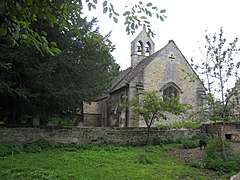 Parish church of Saint Margaret | |
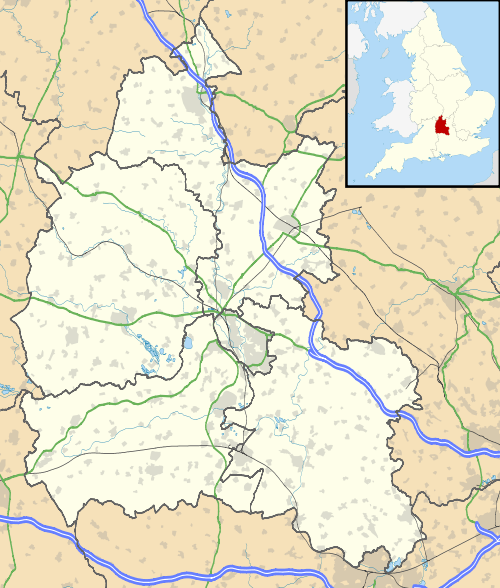 Binsey Location within Oxfordshire | |
| OS grid reference | SP4907 |
| District | |
| Shire county | |
| Region | |
| Country | England |
| Sovereign state | United Kingdom |
| Post town | Oxford |
| Postcode district | OX2 |
| Dialling code | 01865 |
| Police | Thames Valley |
| Fire | Oxfordshire |
| Ambulance | South Central |
| UK Parliament | |
History
Binsey's most noted feature is the parish church of St Margaret, set at some distance north of the surviving houses. It dates from the 12th century and is a Grade I Listed Building.[1][2] Its fame lies mostly in that just outside its west end and belltower stands St Margaret’s Well, a Grade II Listed Building,[3] which is the model for Lewis Carroll’s ‘Treacle Well’ from Alice's Adventures in Wonderland; this is a holy well dedicated to St Frideswide, patron saint of Oxford. According to legend, she fled to Binsey in a bid to escape marriage to a king of Mercia, whose pursuit of her was halted when he was struck blind at the gates of Oxford. Frideswide’s prayers brought forth a healing spring, whose waters cured his blindness, and the spring was walled into a shallow well which became a focus for pilgrimage, the mediaeval sense of the word ‘treacle’ meaning ‘healing unguent’. The well became a pilgrimage site in mediaeval times.[4]
The reason for the apparent separation of church and village is revealed best from the air; cropmarks show the floor-plans of houses that lay along the straight road that runs between them, suggesting a much larger village during the mediaeval period, or possibly one that has ‘migrated’ south.
The village and its associated farmland belonged to St Frideswide's Priory during the 14th and 15th centuries, until the priory's dissolution and (apparently) incorporation into Christ Church, a college of Oxford University, which now owns all of the buildings in Binsey, save one.[5] Plans in 2001 by Christ Church to double the size of the village by demolishing a barn and constructing seven new residences were met with worldwide protests, leading to withdrawal of the proposal.[4]
Binsey features a total of nine listed buildings. As well as St Margaret’s Church and St Margaret’s Well, Binsey has seven other listed buildings:
- Medley Manor Farmhouse[6]
- Manor Farm Cottage[7]
- Manor Farm House[8]
- The Limes (known locally as ‘Great Leys’)[9]
- Barn at Manor Farm[10]
- The Thatched Cottage[11]
- Perch Inn[12][13]
An avenue of poplars in Binsey was made famous by Gerard Manley Hopkins in his poem ‘Binsey Poplars’, written when he found the riverside trees felled. The replacements for these trees, which stretch from Binsey to Godstow, lasted until 2004, when the present replantings began.[14]
Gallery
 Road through Binsey village.
Road through Binsey village.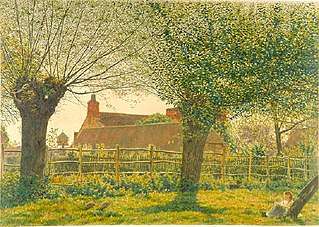 At Binsey, near Oxford (1862), by George Price Boyce.
At Binsey, near Oxford (1862), by George Price Boyce.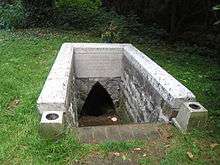 St Margaret's Well, Binsey
St Margaret's Well, Binsey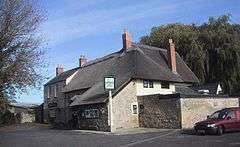 "The Perch" at Binsey
"The Perch" at Binsey
References
- http://osneybenefice.org.uk/node/4/
- Images of England #245335
- Images of England #245336
- At least one pilgrimage still takes place annually: in 2018 the pilgrimage is on Thursday 19 July (the Eve of the Feast of St Margaret) (https://www.osneybenefice.org.uk/events/updated-pilgrimage-holy-well-and-church-st-margaret-antioch). "Binsey beats off new homes bid", Oxford Times, (3 October 2001)
- "U-turn over pub pleases villagers", Oxford Times (10 October 2002) Archived 7 March 2010 at the Wayback Machine
- Images of England #245337
- Images of England #245332
- Images of England #245331
- Images of England #245329
- Images of England #245333
- Images of England #245334
- Images of England #245330
- The Perch The Perch Inn
- Hatts, 2005, page not cited
Sources
- Hatts, Leigh (2005). The Thames Path. Cicerone Press. ISBN 978-1-85284-436-3.
- Sherwood, Jennifer; Pevsner, Nikolaus (1974). The Buildings of England: Oxfordshire. Harmondsworth: Penguin Books. pp. 456–457. ISBN 0-14-071045-0.
External links

